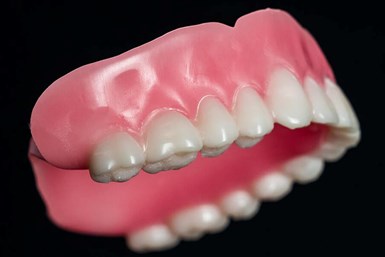Desktop Health, Carbon Validate Flexcera Resins for Digital Manufacturing Platform
The first Flexcera family resin validated for Carbon systems is Desktop Health’s Flexcera Smile Ultra+, an FDA 510(k) cleared Class II material for permanent, 3D printable dental restorations, to be followed closely by Flexcera Base.
Desktop Health (a Desktop Metal brand) and Carbon have validated Flexcera Smile Ultra+ for use on the Carbon platform, thereby expanding access to the nanoceramic resin to hundreds of high-volume dental labs around the globe.
The company says Flexcera Smile Ultra+ delivers exceptional strength, lifelike aesthetics and long-term performance that can revolutionize digital dentistry with permanent 3D printed restorations, including dentures, crowns, bridges, veneers and more. This material represents more than three years of research and development, and leverages proprietary long-chain chemistry to deliver exceptional performance in dental prosthetics. The highly versatile material, one of several Flexcera brand resins available today, can be used to quickly produce customized permanent or temporary solutions.
“Demand for our superior Flexcera family of resins has been overwhelming in the marketplace,” says Ric Fulop, Desktop Metal founder and CEO. “This is the first time we’re making our proprietary resin available to another 3D hardware provider. We’re delighted to work with Carbon, which is widely respected in the dental lab community.”
Carbon says its customers are continuing to lead the charge in converting the industry from analog to digital dentures. “Collectively, they have produced hundreds of thousands of dentures on our platform, but this represents only a small percentage of all dentures made, as we are still in the early innings of 3D printed dentures,” says Phil DeSimone, Carbon Office of the CEO. “We remain dedicated to helping labs meet the growing needs of the industry and are thrilled to offer Flexera Smile Ultra+ to our customers. The materials are highly regarded in the market and are a natural fit within our portfolio.”
Lou Azzara, president of Desktop Health, added, “We are excited to provide the dental community access to the outstanding aesthetic and strength benefits of Flexcera through our partners at Carbon.”
Flexcera Smile Ultra+ is for permanent, printable smiles. It’s a next-generation hybrid nanoceramic resin FDA 510(k) Class II cleared for a wide range of permanent and temporary dental restorations, including teeth for dentures, crowns, inlays, onlays, bridges, veneers, and full, monolithic and partial dentures. Flexcera Smile Ultra+ is currently available in the U.S., and will soon be available in the E.U.
Later this year, Carbon and Desktop Health also plan to release Flexcera Base, adding an additional denture material with exceptional fracture resistance to Carbon's material portfolio.
- Read about Desktop Metal’s launch of Desktop Health for patient-specific solutions. The health care business leverages Desktop Metal’s portfolio of AM solutions for current and future applications spanning dentistry, orthodontics, dermatology, orthopedics, cardiology, plastic surgery, and printed regenerative tissues and grafts.
- Learn about Desktop Health’s FDA clearance for Flexcera 3D printed dentures. The resin technology for dental prosthetics is said to deliver superior strength, aesthetics and function for patients.
Related Content
-
3D Printed Spine Implants Made From PEEK Now in Production
Medical device manufacturer Curiteva is producing two families of spinal implants using a proprietary process for 3D printing porous polyether ether ketone (PEEK).
-
Overcoming Challenges with 3D Printing Nitinol (and Other Oxygen-Sensitive Alloys) Through Atmospheric Control
3D printed nitinol has potential applications in dental, medical and more but oxygen pickup can make this material challenging to process. Linde shares how atmospheric monitoring and the use of special gas mixtures can help maintain the correct atmosphere for printing this shape alloy and other metals.
-
8 Cool Parts From Formnext 2023: The Cool Parts Show #65
New additive manufacturing technologies on display at Formnext were in many cases producing notable end-use components. Here are some of the coolest parts we found at this year’s show.












